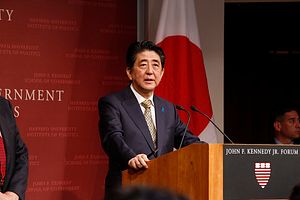At the beginning of May, Japanese Prime Minister Shinzo Abe expressed a willingness to meet with North Korean leader Kim Jong-un “without conditions.” In an exclusive interview with Abe at the time, the Sankei Shimbun called this a “bold and decisive move.” More than two months later, however, the first Japan-North Korea summit in 15 years shows no sign of happening. Critics claim that Japan is “out of the loop” on the North Korean problem.
On June 2, a spokesperson for the Korea Asia-Pacific Peace Committee, an organization controlled by North Korea’s United Front Department, rejected Abe’s proposal to engage in dialogue without preconditions as a “brazen-faced suggestion on the part of the Abe administration as Japan continues to commit wrongdoings in North Korea.” Chinese President Xi Jinping communicated Prime Minister Abe’s wish when he visited Pyongyang in June, but the only response forthcoming from the North Korean leader was that it has been “noted.” The shift in Abe’s policy from calling for “maximum pressure” on North Korea and ruling out “dialogue for dialogue’s sake” continues to be in vain.
This reflects Pyongyang’s deep-seated mistrust of Abe. Tokyo’s policy shift is intended to expedite the resolution of the abduction issue, long a major diplomatic sticking point for Japan. However, it is hard to ascertain whether Japan’s true motive is to solve the abduction problem or whether it was simply trying to give the impression of doing something in the lead-up to the House of Councillors election on July 21, which saw Abe’s party retain its majority.
At the Japan-North Korea Summit convened by Prime Minister Junichiro Koizumi in September 2002, which Abe attended in his capacity as deputy chief Cabinet secretary, Abe received strong public support for his firm stance on North Korea. In September 2006, Abe became Japan’s youngest postwar prime minister.
Some have pointed out that after beginning his second tenure as prime minister in December 2012, Abe has continued to exaggerate the “threat” posed by North Korea. It is always tempting in Japan to score political points by criticizing North Korea. Particularly with the abduction issue, where Japan clearly is the victim, accusations of North Korean dishonesty by politicians and commentators tend to be well received by the public.
All such comments are closely watched by Pyongyang. As are statements such as Abe’s “full support” offered in the wake of the breakdown of the Hanoi talks between North Korea and the U.S. in February this year. Ahead of Japan’s last Lower House elections in 2017, Abe declared that “We will defend to the end the lives and the peaceful daily lives of the Japanese people against the North Korean threat.”
North Korea is looking to normalize its diplomatic relations. In Japan’s case, however, this cannot be achieved without progress on the abduction issue and the support of public opinion. Even if high approval ratings do enable Abe to take bold action, as long as the United Nations Security Council is imposing strict economic sanctions on North Korea there is a limit to the progress that can be made in the bilateral relationship. As such, progress in the U.S.-North Korea denuclearization talks is a necessary condition for improving the relationship between Japan and North Korea.
Still, now that Abe has expressed a willingness to engage in unconditional dialogue, we have entered the stage of considering what cards the Japanese government will play and when, as leverage for progress on the abduction issue. Just as Japan does not trust North Korea’s words when they are not accompanied by actions, so too is North Korea distrustful of Abe’s statements. Complaints from Pyongyang about rewarding words with words and actions with actions were heard many times during the six-party talks.
Yet it is hard to sway public opinion in favor of lifting of Japan’s sanctions when no action is being taken by North Korea. In reality, any discussion will focus on areas that do not offer major benefits for North Korea, such as the easing of some of the original sanctions, including those restricting the movement of people, and improving the status of Korean residents, Zainichi in Japan. And even if action were to be taken on such issues, it is unclear whether Pyongyang will accept that Abe is being sincere.
Atsuhito Isozaki is an associate professor at Keio University.

































